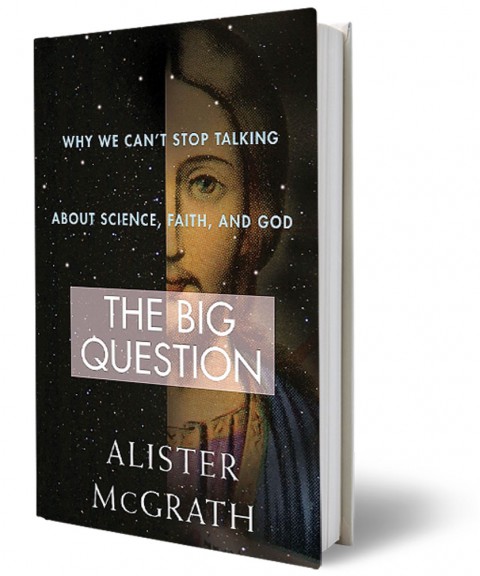 In his recent book The Big Question, Alister McGrath looks at the relationship between science and life’s ultimate questions, including God, meaning, and morality. He notes that some people find it comforting to avoid these ultimate questions and take refuge in what appears to be the safer surroundings of science: “The moment we step outside the safe world of science, we find ourselves in the wastelands of philosophy or theology. Who wants to go there? Let’s limit ourselves to the world of what has been proved and ignore what lies beyond it” (p. 164).
In his recent book The Big Question, Alister McGrath looks at the relationship between science and life’s ultimate questions, including God, meaning, and morality. He notes that some people find it comforting to avoid these ultimate questions and take refuge in what appears to be the safer surroundings of science: “The moment we step outside the safe world of science, we find ourselves in the wastelands of philosophy or theology. Who wants to go there? Let’s limit ourselves to the world of what has been proved and ignore what lies beyond it” (p. 164).
He’s surely right that this is a popular sentiment, although even a brief foray into the philosophy of science brings one to the realization that science is only slightly “safer” than disciplines in the humanities. But “this choice is attractive to some” and is “seen as a safe option” since it follows “the stern intellectual precept of the mathematician W. K. Clifford (1845-79): ‘It is wrong always, everywhere, and for anyone, to believe anything upon insufficient evidence.” (1) But how effective is this principle when it comes to the “Big Questions” of life? McGrath observes,
It is a noble statement, with which I agree entirely in principle. But it is hard to make it work in the real world. It is now seen as little more than a platitude. Why?
For a start, there is a major problem with that elusive word “insufficient.” Who decides what counts as sufficient evidence and what does not? A judgment, itself lying beyond the reach of evidence, is required in order to determine how much evidence is required to legitimize a belief. Clifford was a mathematician, used to working with a world of theorems in which conclusive proof was a realistic possibility. But outside the world of mathematics and logic, things are a lot more ambiguous and fuzzy.
In fact, this approach turns out to have limited relevance even within the natural sciences, despite its initial promise. What about rival theories that are empirically equivalent–that is to say, deemed to be equally supported by the available evidence? . . . For instance, why did the Copenhagen interpretation of quantum theory win out over hidden variable theories or the De Broglie-Bohm theory, when these three are empirically equivalent? Why did the Copenhagen theory gain most support, when it was no more successful at explaining the evidence than its rivals? The answer lies in the contingencies of history, not in the scientific evidence itself. (2)
Furthermore, as the modern debates about cosmology indicate, many theories that were once believed to be well evidenced eventually turn out to be inadequate or completely wrong. . . . The recognition of the difficulties with the seemingly simple idea of a “crucial experiment” and of the general underdetermination of theory by evidence date from after Clifford’s time. (3) Clifford’s intention in formulating this principle was excellent; its application turns out to be rather more complicated and ambivalent.
In practice, human beings tend to work with more pragmatic criteria of justification than those allowed by Clifford. It is not because people are fools. Quite the reverse; it is because they can see the obvious problems with his approach. The Harvard psychologist William James emphasized that we have to search for truth in a world in which the evidence is profoundly ambivalent and open to multiple interpretations. If the true goal of intellectual inquiry is to identify true beliefs rather than simply avoid error, then we will sometimes have to take the risk of believing something to be true without compelling evidence that this is the case. (4) . . .
And, perhaps most importantly, what about the great questions of meaning and ethics which are integral to human existence? These clearly lie beyond the scope of Clifford’s austere and severely limited account of the legitimate outcomes of human rationality. We can, of course, close these discussions down and declare them to be improper. We can be like Richard Dawkins and declare that taking nonscientific answers to “ultimate questions” seriously is merely “resorting to superstition.” (5) Yet pronouncing this kind of rationalist incantation does not solve anything. As William James pointed out, we still end up having to make big decisions–usually moral–and need to base these on something. We cannot opt out of life and the value-based decisions that we need to make.
McGrath is surely right that when it comes to the most important existential questions we face as humans, Clifford’s axiom has significant limitations. There isn’t a simple empirical litmus test that will resolve our most important existential questions.
_________________
1. For a sympathetic account of the background to and ongoing debate concerning this statement, see Tim Madigan, W. K. Clifford and “The Ethics of Belief,” Newcastle: Cambridge Scholars, 2008.
2. See the analysis in James T. Cushing, Quantum Mechanics: Historical Contingency and the Copenhagen Hegemony, Chicago: University of Chicago Press, 1994.
3. See Thomas Bonk, Underdetermination: An Essay on Evidence and the Limits of Natural Knowledge, Dordrecht, the Netherlands: Springer, 2008.
4. For recent discussions, see Robert Audi, “Belief, Faith, and Acceptance,” International Journal for Philosophy of Religion 63, 2008, pp. 87-102.
5. Richard Dawkins, The Selfish Gene, 2nd ed., Oxford: Oxford University Press, 1989, p. 1.
